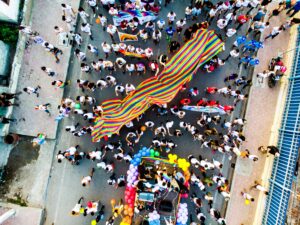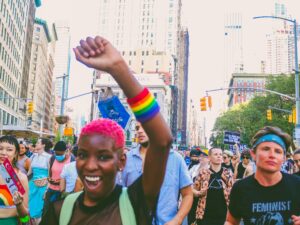
Queering Cannabis: The Intersection of Pride and Cannabis Advocacy
Did you know the history of medical cannabis is queer? This Pride Month, we’re honoring the legacy of queer activism that has not only gained worker protections and marriage rights to millions of LGBTQIA+ Americans, but also established the medical cannabis movement.

This is a story that begins in June of 1969 with the Stonewall Riots, which began as a routine police shakedown of gay and trans bar patrons in lower Manhattan. A night of arrests and street violence transformed into a protest. The fight taken up by Stonewall Inn patrons like Stormé DeLarverie and Marsha P. Johnson galvanized a national movement for queer liberation.
Meanwhile, in Washington D.C. President Nixon requested Congress draft the legislation that would become the Controlled Substances Act. The new federal policy officially classified the substances that fueled the ‘60s counterculture—including LSD, psilocybin, peyote and cannabis—as some of the most dangerous drugs on earth.
Stonewall and the Controlled Substances Act had only the most superficial links—both associated with the astrological season of Cancer and both involved Big Brother cracking down on the counterculture. But the parallel arcs toward justice for the LGBTQIA+ community and cannabis would fully collide twelve years later when another conservative president was in office—Ronald Reagan.
How The HIV / AIDS Crisis Set the Stage for Cannabis Legalization
In June 1981, the CDC reported the first known cases of HIV / AIDS in the United States. The newly minted Reagan administration largely met the AIDS crisis with jokes and apathy. Throughout the late 1970s, members of the so-called “moral majority” like Rev. Jerry Falwell and Anita Bryant had created and advanced a political playbook that included homophobia as one of its key components.
Reagan, who had won the White House with the support of this growing evangelical Christian base, saw little reason to counter their views with a meaningful public health response. By the time he left office, 89,343 people died of HIV / AIDS.
It’s a gross understatement that the plague years were devastating for the queer community. People watched their friends, lovers, family members and neighbors die of painful, mysterious co-infections while wondering helplessly if they might be next. To add insult to injury, the institutional and cultural response to the AIDS crisis only served to further stigmatize queerness, particularly for gay men. It was a period of both individual and collective trauma that still deeply affects LGBTQIA+ Americans today—and queer elders in particular.
The queer community wasn’t going to go down without a fight, however. More than a few HIV / AIDS patients and their caregivers consumed cannabis despite federal prohibition. And many noticed that cannabis seemed to ease some of the hallmark symptoms of HIV / AIDS, decreasing nausea and physical discomfort while increasing appetite and elevating mood. Cannabis might not be a cure—but it was a kindness in the final months and years of patients’ lives.
Cannabis Legalization: Straight Outta the Castro
One of the early connections between cannabis and palliative care for AIDS patients was made by Mary Rathbun, better known as Brownie Mary. Mary earned the magic moniker from selling pot brownies throughout the Castro District, which had become a “gayborhood” as veterans who had served in World War II and later Vietnam settled in San Francisco, and into their queer identities.
Mary began volunteering at the Shanti Project, a non-profit that provides compassionate care for people living with life-threatening and terminal illnesses. The Shanti project was one of the first community-based organizations to provide support to HIV / AIDS patients, and in 2016 expanded its services to address the social, psychological and health challenges faced by LGBTQIA+ seniors.
One of the vets who came home to the Castro was Dennis Peron, who supported himself in the illicit cannabis market. He befriended Harvey Milk, another early cannabis advocate who became the first openly gay man elected to public office in California and who was assassinated in 1987. Just three years after losing his friend, Peron lost his partner Jonathan West to HIV/ AIDS.
Inspired by the queer community’s grassroots use of cannabis for compassionate, palliative care and motivated by grief, Peron agitated for the passage of San Francisco’s Proposition P, which cleared a legislative path for medical cannabis legalization in California. Peron first opened the Church Street Compassion Center in 1993 and two years later launched the San Francisco Cannabis Buyers Club, the first public medical cannabis dispensary in the country.
Peron continued to work toward cannabis legalization and his efforts led directly to the passage of Proposition 215, better known as the Compassionate Use Act of 1996. Twenty seven years after the modern gay rights movement began at Stonewall and cannabis was classified as a Schedule I drug with no medical value, queer activists and their allies finally made medical cannabis available to patients throughout California.
The Current State of Public Health in the LGBTQIA+ Community
Although HIV / AIDS remains a public health concern, it is no longer devastating the queer community at the same rates as during the plague years. That said, LGBTQIA+ Americans are still deeply, disproportionately affected by other serious health concerns, including increased risk of post-traumatic stress disorder and substance use disorders. Compounding the impact of those mental health conditions are numerous health care accessibility barriers for queer people, including homophobia and transphobia, discrimination on the grounds of religious exemption and increased rates of poverty.
Both medical and adult-use cannabis are now available in the majority of US states. The increasing accessibility of cannabis may not directly help trans people receive gender-affirming care or increase the number of licensed therapists who specialize in, say, queer or religious trauma. But the greater availability of plant medicine does help thousands of LGBTQIA+ Americans treat a wide range of conditions, from anxiety, depression and chemical dependency to chronic pain to epilepsy and even terminal illness.
Not only that, the very option to buy legal weed at all is an affirmation of decades of work by queer activists to provide their community the compassion and care that federal, state and local governments would not.

Next time you make a purchase at the dispensary—or pick up compassion —remember that the same community that fought for and won your access to legal cannabis is currently facing a serious erosion of their legal rights. In 2023, a record number of anti-LGBTQIA+ legislation was pushed forward and hate crimes quadrupled. After decades of incremental and hard-won progress, queer, trans and nonbinary people are being delegitimized and retraumatized as we speak.
This June and throughout the year, we invite you to honor the queer history of legal cannabis by standing with your LGBTQIA+ neighbors as they battle the injustices of an intolerant world.
cannabis advocacy, Cannabis legalization, compassionate cannabis, history of legal weed, human rights, LGBTQ+, LGBTQIA+, medical cannabis, PRIDE, public health
